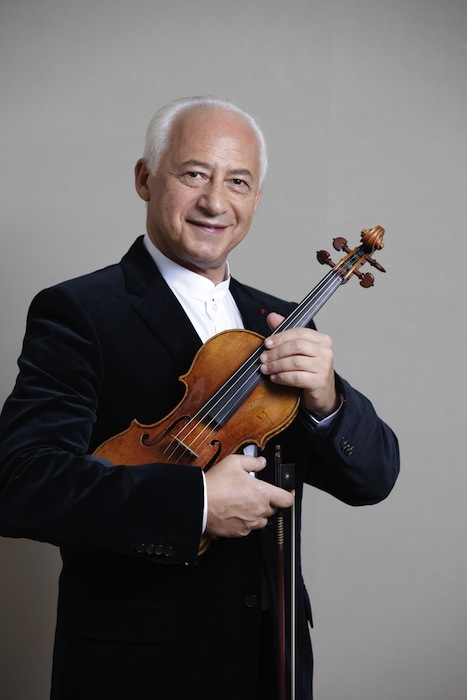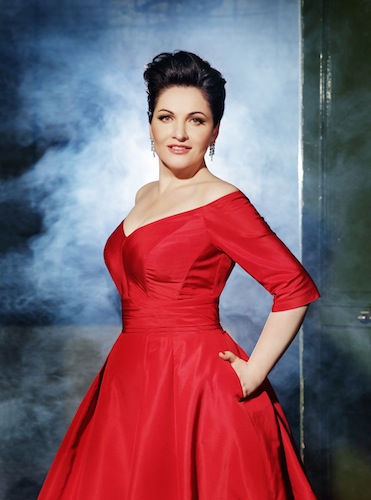Moscow Virtuosi return for a familial evening with friends
Is there a more loyal classical audience than a Russian classical audience?
One can always count on a significant turnout from the local Russian community whenever top Russian musicians come to town. But Sunday night at the concert of the Moscow Virtuosi Chamber Orchestra at Symphony Center there was decisively more Russian being spoken in the lobby and aisles than English.
The audience’s enthusiasm was heartfelt and, at times, unrestrained–several people were recording the performance on cell phones, and a woman in a headscarf bolted to the front of the stage three times to present homemade bags of gifts (or something) to the soloists and conductor. (Vladimir Spivakov seemed a bit wary before cautiously accepting his.)
The Moscow Virtuosi was founded in 1979 by violinist-conductor Spivakov, who continues to lead the ensemble after nearly four decades. On its current U.S. tour, Spivakov is presenting the same gala-style program at each stop–two guest soloists and several pieces, mostly short and on the lighter side. Aside from a lone female second violinist, the otherwise all-male, 29-member ensemble was nattily attired in dark jackets, ties and gray vests.
If the program and much of the music-making leaned toward the comfortable and easily digestible, it seemed well suited to please the audience whose vocal support lent an almost familial atmosphere to the occasion.
The opener of Mozart’s Divertimento No. 1 in D major, K.136, was clearly designed to show off the virtuosity of the group’s strings, which it did with especially dazzling playing in the final movement. Yet the emphasis seemed focused on speed and brilliance rather than Mozartean grace; there with more suavity than expressive feeling in the Andante and the speedy opening movement was closer to a Presto than the marked Allegro.
Cellist Danielle Akta, already a well-traveled musician and winner of numerous awards, was heard in two works. The young Israeli played Bruch’s Kol Nidre with apt febrile feeling, drawing a warm, caressing tone from her 20th-century Enrico Orselli instrument. David Popper’s Concerto Polonaise proved more mixed with the gifted 14 year old sounding like—well, like a gifted 14 year old. There were pitchy moments in the most challenging passages even at Spivakov’s helpfully generous tempo.
The most substantive work of the evening was Shostakovich’s Chamber Symphony– Rudolf Barshai’s masterful transcription for string orchestra of Shostakovich’s Eighth String Quartet.
Spivakov drew an alert, focused performance of this dark, war-torn music, dedicated by the composer “to the memory of the victims of Fascism and war” (not “Nazism and war,” as in the program). The conductor skillfully held together the five interconnected movements and the Virtuosi strings played with responsive commitment.
Yet considering the depth of devastation in this music, the performance felt too cool and streamlined, more legato in style than the music requires. One admired the focus and precision of the playing–apart from a rather pinched climactic cello solo–but the work requires a more raw, visceral approach and greater emotional intensity than heard in this performance. The ray of sunlight after surmounted tragedy at the coda didn’t really register because the tragic depths of the music weren’t fully explored.
There were also ardent readings of Grieg’s Two Elegiac Melodies. More diverting was the amiable Hymn to Beauty by Friedrich Gulda, which provided some welcome individuality with the personality-plus oboe playing of Konstantin Konyakhin.
Much of the second half was dominated by soprano Hibla Gerzmava, a Metropolitan Opera regular who possesses an attractive, smoky voice.
She opened with “Casta Diva” from Bellini’s Norma. The Act 1 showpiece was an odd choice for her low-lying instrument and, indeed, sounded as if the aria had been transposed down. Gerzmava delivered a poised, graceful reading, albeit missing the rapt, otherworldly quality this music deserves. The ensuing cabaletta, however was agile and spirited.
The ensuing items proved more congenial. Gerzmava made an impassioned mini-scena out of Amalia’s “Tu del mio Carlo” from Verdi’s I Masnadieri and gave an affecting take on the diva evergreen “Io son l’umile ancella” from Cilea’s Adriana Lecouvreur. She lightened the mood effectively with a charming rendition of Poulenc’s lilting waltz-song “Les Chemins de l’amour,” followed by a lyrical Italianate rendition of de Curtis’s song “Ti voglio tanto bene.”
The enthusiastic rhythmic applause brought singer and conductor back out for an encore of Puccini’s inescapable “O mio babbino caro.” The final music of the evening was Richard Strauss’s “Morgen,” given a glowing performance by Gerzmava. Spivakov played the song’s violin solo himself with such lovely nuance and delicacy one wished he had been featured more prominently as instrumentalist on the program.
Posted in Uncategorized



